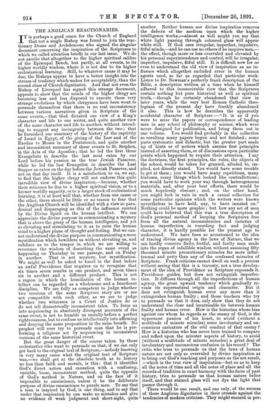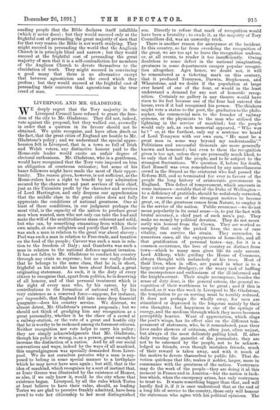THE ANGLICAN REACTIONARIES.
IT is perhaps a good omen for the Church of England that not a single Bishop was found to join the reac- tionary Deans and Archdeacons who signed the singular document concerning the inspiration of the Scriptures to which we called attention briefly in our last issue. We do not ascribe that altogether to the higher spiritual calibre of the Episcopal Bench, but partly, at all events, to its higher worldly wisdom, where it is not due to its higher ecclesiastical learning. Still, to whatever cause it may be due, the Bishops appear to have a better insight into the stream of tendency which makes for acceptability, than the second class of Church dignitaries. And that not even the Bishop of Liverpool has signed this strange document, appears to show that the minds of the higher clergy are becoming less and less disposed to execute those very strange evolutions by which clergymen have been wont to persuade themselves that there is no real inconsistency between various narratives given in Scripture of the same events,—that God dictated one view of a King's character and life to one writer, and quite another view of the same character and life to another, without intend- ing to suggest any incongruity between the two ; that he furnished one summary of the history of the captivity of Israel in Egypt, of the giving of the Law and of the Exodus to Moses in the Pentateuch, and quite another and inconsistent summary of those events to St. Stephen, in the Acts of the Apostles ; that he led the first three Evangelists to describe the last meal eaten by our Lord before his passion as the true Jewish Passover, while he led the last Evangelist to describe the Last Supper as eaten on the day before the Jewish Passover, and not on that day itself. It is a satisfaction to us, we say, to find that the higher clergy will not endorse this quite incredible view of divine inspiration,—because, whether their reticence be due to a higher spiritual vision, or to a keener worldly sagacity, or to a larger stock of ecclesiastical learning, it is at least well that, whether from one cause or the other, there should be little or no reason to fear that the Anglican Church will be identified with a view so para- doxical and disparaging as this of the influence exerted by the Divine Spirit on the human intellect. We can appreciate the divine purpose in communicating a mystery that is above the grasp of the human intelligence, and yet so elevating and stimulating to it as to raise the human mind to a higher plane of thought and feeling. But we can- not understand the divine purpose in communicating a mere mystification which bewilders us without elevating us, and subdues us to the temper in which we are willing to reverence the wisdom of describing the same event as happening on Thursday in one passage, and on Friday in another. That is not mystery, but mystification.• We might as well be asked to kneel in the dust before an awful Providence that requires us to recognise that six times seven results in one product, and seven times six in another and a different product. This is not a region in which the humiliation of the human in- tellect can be regarded as a wholesome and a beneficent discipline. We are fully as competent to judge whether two versions of the same Scripture story are or are not compatible with each other, as we are to judge whether two witnesses in a Court of Justice do or do not tell diametrically inconsistent tales. To force us into acquiescing in absolutely divergent accounts of the same event, is not to humble us morally before a perfect righteousness, but to confuse us intellectually into affirming and denying the same proposition in the same breath. No prophet will ever try to persuade man that he is per- forming a religious act by acquiescing in inconsistent versions of the same historical event.
But the great danger of the course taken by those ecclesiastics who want to persuade us that, if we can only get back to the original text of Scripture,—nobody knowing in very many cases what the original text of Scripture was,—we shall get at the absolute truth as to history no less than faith and morals, is this : that it identifies God's direct action and causation with a confusing, variable, loose, inconsistent method, quite the opposite of God's method in Nature, and on the face of it impossible to omniscience, unless it be the deliberate purpose of divine omniscience to puzzle men. To say that a man is inspired by God, is one thing, and to say that under that inspiration he can make no mistakes and give no evidence of weak judgment and short-sight, quite another. Neither human nor divine inspiration removes the defects of the medium upon which the higher intelligence works ;—almost as well might you say that white light passing through coloured glass -will appear white still. If God uses irregular, imperfect, impulsive, fitful minds,—and he can use no others if he inspires men,— the effect, though more or less overruled and elevated by his personal superintendence and control, will be irregular, imperfect, impulsive, fitful still. It is difficult now for us even to understand the old view of inspiration as an in- fluence which altogether excluded error in the human agents used, so far as regarded that particular .work. Listen to Dr. Newman's perfectly frank description of the Bible, a description written at a time when he himself adhered to this inconceivable view that the Scriptures contain nothing but pure historical as well as spiritual truth,—though he certainly abandoned that view in later years, while the very best Roman Catholic theo- logians of the present day have frankly abandoned it also. This is how he describes the apparently accidental character of Scripture :—" It is as if you were to seize the papers or correspondence of leading men in any school of philosophy or science, which were never designed for publication, and bring them out in one volume. You would find probably in the collection so resulting many papers begun and not finished ; some parts systematic and didactic, but the greater part made up of hints or of notices which assume first principles instead of asserting them, or of discussions upon particular points which happened to require their attention. I say the doctrines, the first principles, the rules, the objects of the school, would be taken for granted, alluded to, im- plied, not directly stated. You would have some trouble to get at them ; you would have many repetitions, many hiatuses, many things which looked like contradictions ; you would have to work your way through heterogeneous materials, and, after your best efforts, there would be much hopelessly obscure ; and, on the other hand, you might look in vain in such a casual collection for some particular opinions which the writers were known nevertheless to have held, nay, to have insisted on." Nothing could be more graphic ; but how any set of men could have believed that this was a true description of God's personal method of keeping the Scriptures free from all the natural inconsistencies and varieties of human imperfection in recording fact and judging character, it is hardly possible for the present age to understand. We have been so accustomed to the idea of tracing divine agency in the laws of Nature, that we can hardly conceive finite, fretful, and faulty man made into the organ of infallible wisdom without assuming fifty thousand minute precautionary miracles far more infini- tesimal and petty than any of the confessed miracles of Scripture. Frank criticism cannot dwell on such a process without seeing that this is a travesty, not a true develop- ment of the idea of Providence as Scripture expounds it. Providence guides, but does not extinguish imperfec- tion. It diffuses through all the imperfections of human agency, the great upward tendency which gradually re- veals its supernatural origin and character. But it does not extinguish human error any more than it extinguishes human frailty ; and those teachers who try to persuade us that it does, only show that they do not understand the close and inextricable tie between human frailty and human error. How is the historian whose bias against one whom he regards as the enemy of God, is the uppermost passion of his heart, to avoid (without a multitude of minute miracles) some involuntary and un- conscious caricature of the evil conduct of that enemy ? How is a historian who has never been trained to compare and reflect upon the minuter aspects of history, to avoid (without a multitude of minute miracles) a great deal of involuntary and unconscious confusion in his record ? The critic who tries to persuade us that the laws of human nature are not only so overruled by divine inspiration as to bring out God's teaching and purposes as the net result, —which is the true view of inspiration—but so as to keep all the notes of time and all the notes of place and all the records of tradition in exact harmony with the facts of past history, tries to persuade us that human nature belies itself, and that stained glass will not dye the light that passes through it. There would be one result, and one only, of the success of these Anglican dignitaries in their crusade against the tendencies of modern criticism. They might succeed in per- sua,ding people that the Bible declares itself infallible (which it never does) ; but they would succeed only at the frightful cost of persuading the great majority of men that for that very reason the Bible is not worth studying. They might succeed in persuading the world that the Anglican Church is in principle blind and narrow ; but they would succeed at the frightful cost of persuading the great majority of men that it is a self-contradiction for members of the Anglican Church to devote themselves to the elucidation of truth. They might succeed in convincing a good many that there is no alternative except that between agnosticism and the creed which they profess ; but they would succeed at the frightful cost of persuading their converts that agnosticism is the true creed of man.



































 Previous page
Previous page